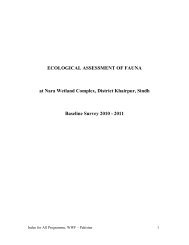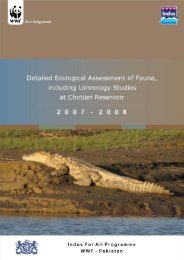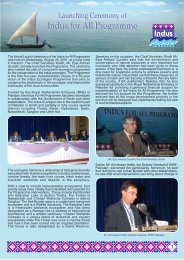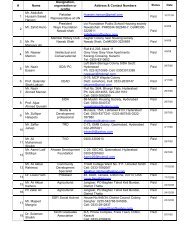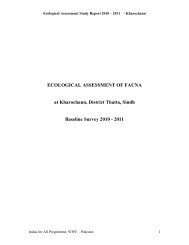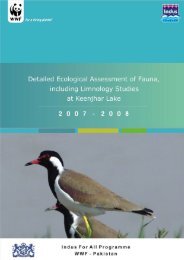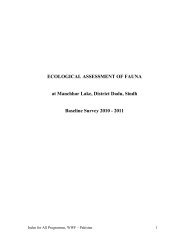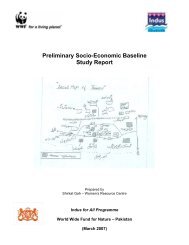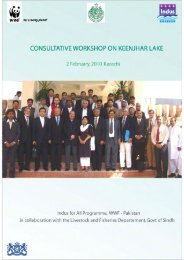Disclaimer note - WWF - Pakistan
Disclaimer note - WWF - Pakistan
Disclaimer note - WWF - Pakistan
You also want an ePaper? Increase the reach of your titles
YUMPU automatically turns print PDFs into web optimized ePapers that Google loves.
Detailed Ecological Assessment Report 2008 – Keti Bunder<br />
Figure 7 – Shannon and Margalef indexes for summer and winter at Keti Bunder<br />
Diversity values<br />
3.5<br />
3<br />
2.5<br />
2<br />
1.5<br />
1<br />
0.5<br />
0<br />
2.89<br />
2.38 2.32<br />
2.77<br />
Summer Winter<br />
Season<br />
Shannon Index<br />
Margalef Index<br />
3.3.4 Discussion<br />
More species of reptiles and amphibians were recoded during summer that in<br />
winter at Keti Bunder. Given the hibernating nature of reptiles and amphibians,<br />
thus is not an unusual phenomenon. The evenness of species was greater in<br />
winter than summer presumably because in summer there is more variation in the<br />
available species population<br />
3.3.5 Threats and recommendations<br />
3.3.5.1 Threats<br />
• The increased demand of seafood for export has led to the mechanization<br />
of fishing crafts, which is not only responsible for over-exploitation of<br />
fishery resources but also causing threats to un-targeted vulnerable and<br />
endangered sea turtle species through their entanglement in fishing gears<br />
or accidental capture.<br />
• Due to lack of proper sewage water and solid waste disposal systems,<br />
Keti Bunder area is heavily polluted. Extensive farmland and agricultural<br />
activities are causing pesticides contamination in the sea and ground<br />
water, keeping the fauna of the sea, as well the population of Keti Bunder,<br />
at stake.<br />
• All the lizards and snakes are regarded as poisonous by the locals and<br />
thus are killed on sight, without considering its impacts, ultimately<br />
decreasing the herpetile population.<br />
• Some of the reptilian species, which are protected under IUCN categories,<br />
are killed on roads. The road-kills of Varanus species (Monitor lizards) are<br />
self-evident and are increasing at a rapid scale due to infrastructure and<br />
road construction.<br />
<strong>WWF</strong> <strong>Pakistan</strong> – Indus for All Programme Page 49 of 188



